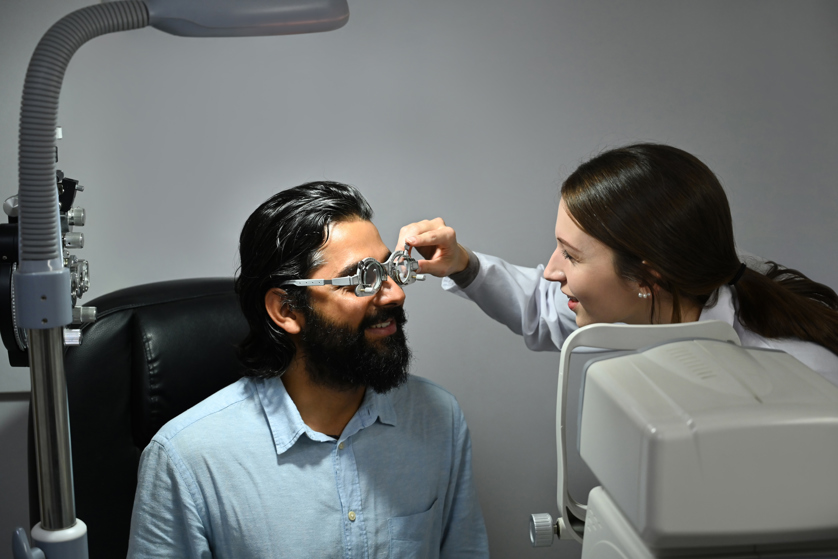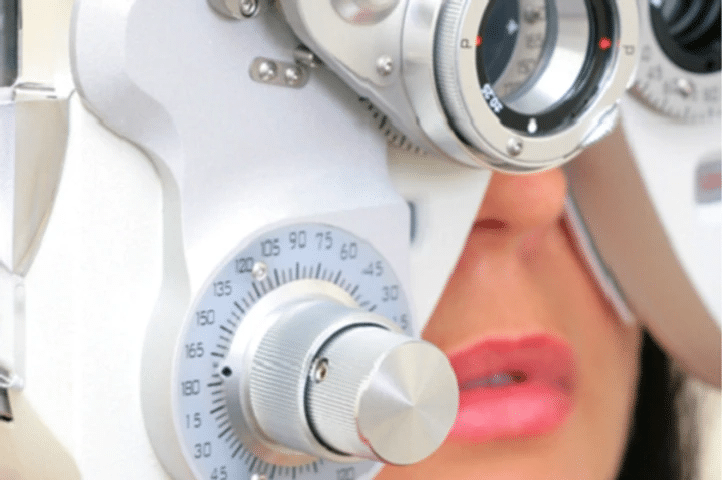Preventative eye care is the cornerstone of optimal eye health.
The only way to achieve this is through regular eye health checks conducted by professionals.
During this type of visual assessment, opticians often use advanced equipment to perform a comprehensive eye exam. Their intervention highlights the significance of early detection and emphasises the importance of regular eye exams.
Whether you're young or old, you don't want to turn a blind eye to your eye health. This article will discuss the ins and outs of maintaining your eye health and the crucial role regular eye exams play in safeguarding your vision for years to come.

The Importance Of Professional Eye Health Checks
Taking care of your eye health is not just about seeing clearly - it's about safeguarding one of your most precious senses. While self-examinations at home - such as closing alternative eyes to read a chart - may be helpful, it has its limitations and does not reveal all potential issues.
This is where professional eye health checks come in. The importance of regular eye exams goes far beyond what you can achieve on your own at home and offers unparalleled benefits in preventive eye care measures. Keeping your eyes healthy and disease-free is vital in maintaining your overall well-being.
Benefits of comprehensive eye examinations
-
Expertise: Opticians are eye care professionals with a deep understanding of the human eye. Their expertise helps to identify existing eye conditions, provide accurate diagnosis, early detection of eye problems, and help with preventive eye care measures. Their specialised training enables them to do thorough visual assessments, giving you valuable insights into your eyesight!
-
Early detection of eye problems: As mentioned, the importance of regular eye exams are essential for early detection of eye conditions. Many eye diseases, such as age-related macular degeneration, glaucoma and diabetic retinopathy, develop gradually. Detecting issues early on allows for quick intervention, preventing further complications.
-
Peace of mind: Beyond the benefits of early detection, professional eye care provides peace of mind. Knowing that you've taken preventive eye care measures allows you to focus on what matters most - living life to the fullest, with clear vision!
Tips For Keeping Eyes Healthy
While a regular eye examination is important, here are some lifestyle tips on how you can keep your eyes healthy in between assessments:
-
Regular eye tests: As mentioned, going for a regular eye test is essential in assessing your overall eye condition. These tests are conducted by an optician (eye doctor) and are good for early detection of any eye-related diseases.
-
Safety glasses: Wear protective eyewear for activities that may pose an increased risk to your eyes. These activities include; playing sports, DIY projects and swimming.
-
Wear sunglasses: Always protect your eyes when going outside. Wearing polarised sunglasses with UV protection can help minimise the effects of harmful sun rays.
-
Take screen breaks: Follow the 20-20-20 rule: Every 20 minutes, look at something 20 metres away for 20 seconds. This is helpful to prevent eye strain when sitting in front of the computer screen for prolonged periods.
-
Quit smoking: Smoking increases risk factors associated with various eye conditions. These include; cataracts, macular degeneration, and optic nerve damage.
-
Balanced diet: Good eye health starts with a good diet. Eating a balanced diet rich in omega-3 fatty acids, vitamin C, vitamin E, and zinc can keep your eyes healthy.
-
Manage your health: Maintaining healthy blood pressure, cholesterol, and blood sugar levels not only reduces your risk of heart disease but can prevent many eye diseases too.
Advanced Equipment For Eye Health Checks
Below are some of the advanced eye exam equipment used when having your eyes tested.
-
Retinal camera: This is a specialised camera that captures images of the condition of the retina.
-
Slit lamp: This is a sophisticated microscope used to check the condition of the eye's internal structure, such as the cornea, iris and lens.
-
Tonometer: This device blows a quick puff of air into the eye, measuring intraocular pressure (IOP) - the pressure inside the eye. This test is particularly helpful in the early detection of glaucoma and to assess potential irregularities.
-
Autorefractor: An autorefractor machine is used for refraction tests. This assesses pupil function and response and helps to calculate your eyewear prescription.
-
Ophthalmoscope: This is a specialised torch used to assess the retina, optic nerve, and blood vessels. It is used to detect any irregularities and is helpful in providing opticians with accurate diagnosis and/or prescription needs.

What Is A Comprehensive Eye Health Assessment?
A visual assessment should not only be done when needing medical assistance but should be done once a year, especially over the age of 40.
Here's a breakdown of what a typical eye check entails:
-
Questions about your medical history.
-
Questions about your family history and/or any family eye diseases.
-
Snellen's visual acuity chart test (viewing letters or shapes on a chart at varying distances).
-
A thorough assessment of your internal eye, such as the retina, optic disc and blood vessels.
-
An assessment of the outer eye areas, such as eyelids and lashes.
-
Slit-lamp assessment.
-
Standard colour perception test.
-
Measurement of eye pressure - using a tonometer.
-
Refraction tests - for checking pupil function and response - using an autorefractor machine.
-
Assessment of eye muscles and coordination - known as an extraocular muscle test.
Additional tests
-
Visual field test: This eye test helps to assess your peripheral vision (the ability to see objects around you when looking straight ahead). It's particularly helpful in the early detection of glaucoma.
-
Corneal topography: This procedure involves assessing the surface of your cornea (the area responsible for focusing). This exam is useful in diagnosing conditions like keratoconus (bulging of the cornea) and astigmatism.
-
Comprehensive dilated eye exam: During this dilated eye test, special eye drops are used to dilate or widen the pupils. This allows opticians to see the inside of the eye more clearly, checking for conditions such as glaucoma, cataracts and age-related macular degeneration - to name a few.
-
Retinoscopy: This is a form of eye test where an optician shines a light into each eye while you focus on an object in the distance. This test helps to calculate your eyewear/contact lens prescription.
Early detection of eye problems
Kids' eye health is just as important as it is for adults. The importance of eye health is vital in preventing some of these common eye diseases in people of all ages:
-
Myopia
-
Hyperopia
-
Astigmatism
-
Glaucoma
-
Cataracts
-
Diabetic retinopathy
-
Macular degeneration
-
Hypertensive retinopathy
-
Strabismus
-
Amblyopia
Encouraging Professional Eye Care
Keeping your eyes healthy begins with scheduling regular visual assessments. These are fundamental steps towards preserving your vision and overall well-being. While self-awareness and self-examinations are valuable, they have limitations in terms of expert intervention.
A regular eye test conducted by a trained professional ensures a comprehensive visual assessment that extends far beyond what you can achieve at home. From detecting subtle warning signs of glaucoma to the need for prescription glasses, these professionals play a vital role in safeguarding your vision.
Furthermore, if you have a family history of eye-related diseases or premature sight loss, the importance of your eyesight is even more important!
So, if you are concerned about your (or your child's vision), it's never been easier to find nearby opticians with Book An Eye Test's directory platform.






